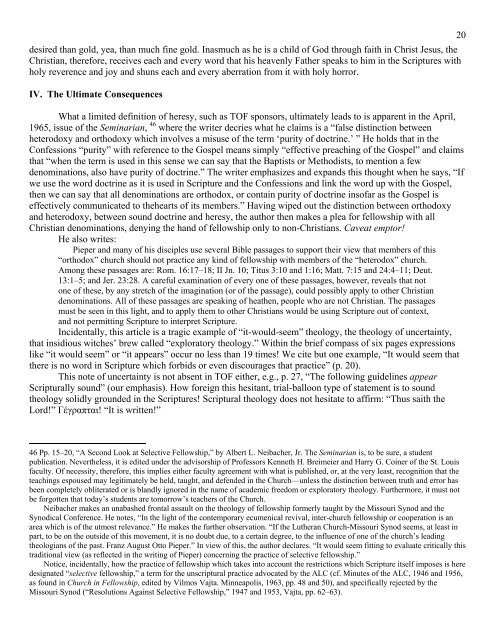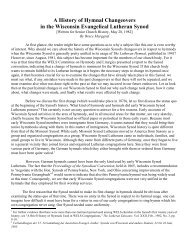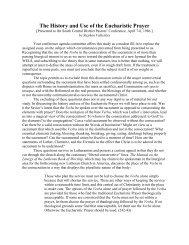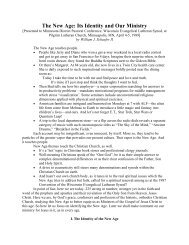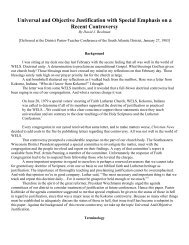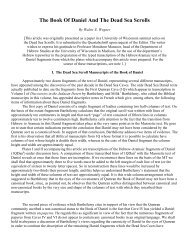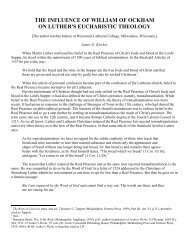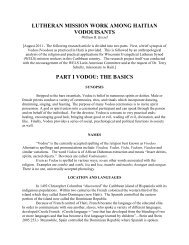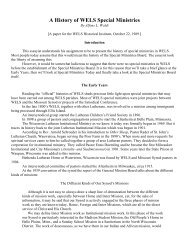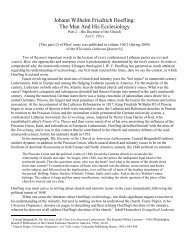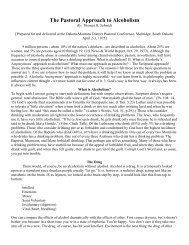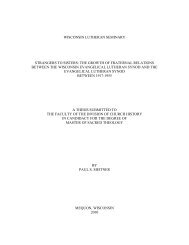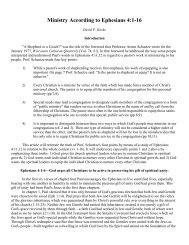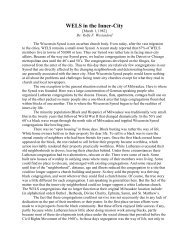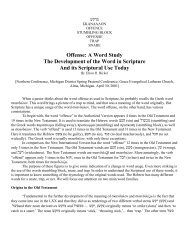What Is Heresy? - Wisconsin Lutheran Seminary Library: Essays
What Is Heresy? - Wisconsin Lutheran Seminary Library: Essays
What Is Heresy? - Wisconsin Lutheran Seminary Library: Essays
Create successful ePaper yourself
Turn your PDF publications into a flip-book with our unique Google optimized e-Paper software.
20<br />
desired than gold, yea, than much fine gold. Inasmuch as he is a child of God through faith in Christ Jesus, the<br />
Christian, therefore, receives each and every word that his heavenly Father speaks to him in the Scriptures with<br />
holy reverence and joy and shuns each and every aberration from it with holy horror.<br />
IV. The Ultimate Consequences<br />
<strong>What</strong> a limited definition of heresy, such as TOF sponsors, ultimately leads to is apparent in the April,<br />
1965, issue of the Seminarian, 46 where the writer decries what he claims is a “false distinction between<br />
heterodoxy and orthodoxy which involves a misuse of the term ‘purity of doctrine.’ ” He holds that in the<br />
Confessions “purity” with reference to the Gospel means simply “effective preaching of the Gospel” and claims<br />
that “when the term is used in this sense we can say that the Baptists or Methodists, to mention a few<br />
denominations, also have purity of doctrine.” The writer emphasizes and expands this thought when he says, “If<br />
we use the word doctrine as it is used in Scripture and the Confessions and link the word up with the Gospel,<br />
then we can say that all denominations are orthodox, or contain purity of doctrine insofar as the Gospel is<br />
effectively communicated to thehearts of its members.” Having wiped out the distinction between orthodoxy<br />
and heterodoxy, between sound doctrine and heresy, the author then makes a plea for fellowship with all<br />
Christian denominations, denying the hand of fellowship only to non-Christians. Caveat emptor!<br />
He also writes:<br />
Pieper and many of his disciples use several Bible passages to support their view that members of this<br />
“orthodox” church should not practice any kind of fellowship with members of the “heterodox” church.<br />
Among these passages are: Rom. 16:17–18; II Jn. 10; Titus 3:10 and 1:16; Matt. 7:15 and 24:4–11; Deut.<br />
13:1–5; and Jer. 23:28. A careful examination of every one of these passages, however, reveals that not<br />
one of these, by any stretch of the imagination (or of the passage), could possibly apply to other Christian<br />
denominations. All of these passages are speaking of heathen, people who are not Christian. The passages<br />
must be seen in this light, and to apply them to other Christians would be using Scripture out of context,<br />
and not permitting Scripture to interpret Scripture.<br />
Incidentally, this article is a tragic example of “it-would-seem” theology, the theology of uncertainty,<br />
that insidious witches’ brew called “exploratory theology.” Within the brief compass of six pages expressions<br />
like “it would seem” or “it appears” occur no less than 19 times! We cite but one example, “It would seem that<br />
there is no word in Scripture which forbids or even discourages that practice” (p. 20).<br />
This note of uncertainty is not absent in TOF either, e.g., p. 27, “The following guidelines appear<br />
Scripturally sound” (our emphasis). How foreign this hesitant, trial-balloon type of statement is to sound<br />
theology solidly grounded in the Scriptures! Scriptural theology does not hesitate to affirm: “Thus saith the<br />
Lord!” Γέγραπται! “It is written!”<br />
46 Pp. 15–20, “A Second Look at Selective Fellowship,” by Albert L. Neibacher, Jr. The Seminarian is, to be sure, a student<br />
publication. Nevertheless, it is edited under the advisorship of Professors Kenneth H. Breimeier and Harry G. Coiner of the St. Louis<br />
faculty. Of necessity, therefore, this implies either faculty agreement with what is published, or, at the very least, recognition that the<br />
teachings espoused may legitimately be held, taught, and defended in the Church—unless the distinction between truth and error has<br />
been completely obliterated or is blandly ignored in the name of academic freedom or exploratory theology. Furthermore, it must not<br />
be forgotten that today’s students are tomorrow’s teachers of the Church.<br />
Neibacher makes an unabashed frontal assault on the theology of fellowship formerly taught by the Missouri Synod and the<br />
Synodical Conference. He notes, “In the light of the contemporary ecumenical revival, inter-church fellowship or cooperation is an<br />
area which is of the utmost relevance.” He makes the further observation. “If the <strong>Lutheran</strong> Church-Missouri Synod seems, at least in<br />
part, to be on the outside of this movement, it is no doubt due, to a certain degree, to the influence of one of the church’s leading<br />
theologians of the past. Franz August Otto Pieper.” In view of this, the author declares. “It would seem fitting to evaluate critically this<br />
traditional view (as reflected in the writing of Pieper) concerning the practice of selective fellowship.”<br />
Notice, incidentally, how the practice of fellowship which takes into account the restrictions which Scripture itself imposes is here<br />
designated “selective fellowship,” a term for the unscriptural practice advocated by the ALC (cf. Minutes of the ALC, 1946 and 1956,<br />
as found in Church in Fellowship, edited by Vilmos Vajta. Minneapolis, 1963, pp. 48 and 50), and specifically rejected by the<br />
Missouri Synod (“Resolutions Against Selective Fellowship,” 1947 and 1953, Vajta, pp. 62–63).


